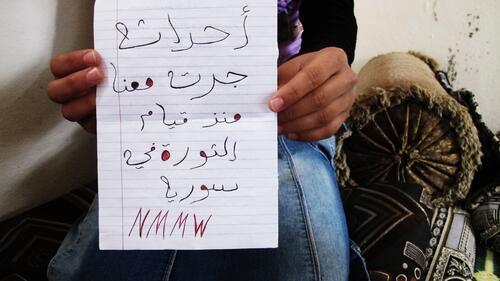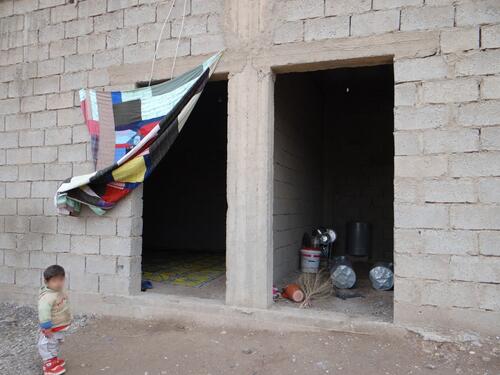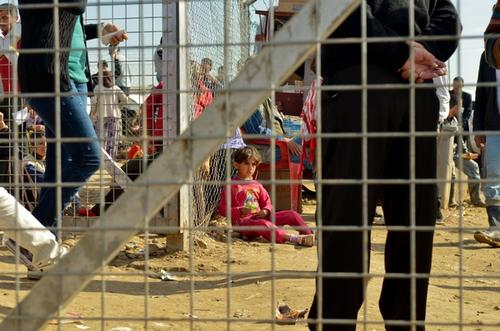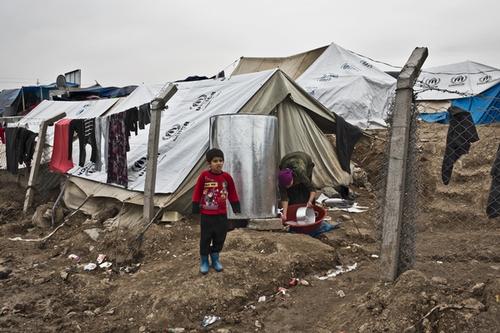A large family is staying in a ramshackle house in northern Syria. For half a year, Nermin, her parents, and seven brothers and sisters have been on the run from the conflict, moving from place to place through one of the poorest regions of Syria to escape the fighting. Nermin kept a diary of her family’s flight. This is their story.
In 2011, the battlegrounds of the conflict were the cities of Homs and Hama, but soon it reached the country’s industrial and financial centre, Aleppo, and the surrounding countryside. Azaz, where Nermin’s family lives, is a town in northern Syria, between Aleppo and the Turkish border. Nermin’s diary starts here.
28/2/2012: Helicopters arrive in Azaz.
Mohammed, Nermin’s father, remembers that painful day at the end of February. “It was Saturday. I was working and people started running.” He had no idea what was happening – the conflict had only just reached his hometown. “Everyone was telling me to leave work and look for my kids. But on the way home I found my path blocked by a tank.”
Sabah, Nermin’s mother, picks up the thread. “Our neighbours told me the tanks were getting closer, so I was getting everything ready to leave. My kids were with me, but I was worried about my husband.” At last Mohammed joined the rest of the family. “We heard helicopters and we stayed in the corner of a room, praying. We thought we were going to die.”
29/2/2012: We have run away from our home in Azaz, and are at my aunty’s place, in the town of Ihtemlat.
The names of Nermin’s aunt and grandfather crop up often in her diary. Relatives have been the main safety net for this family in their escape from fighting between the armed opposition and the Syrian Army. Nermin is one of 1.2 million people who have been displaced within Syria due to the conflict. Most are receiving virtually no assistance, and their humanitarian needs are growing.
Nermin’s family stay with relatives, moving on to a different person’s home every few days. They would like to stay in the Azaz area, but the fighting has not stopped, and it is no longer safe for them to stay in the town. “We decided that we had to leave Azaz and the surrounding area once and for all,” says Mohammed. “We weren’t the only ones,” says Sabah. “I saw many families and neighbours leaving on foot, carrying their clothes, carrying everything they could. Their houses were being bombed.” The family’s flight is just beginning.
27/3/2012: After three days at my aunty’s, we are moving to Aleppo.
The family decides to head for Aleppo. They are taken in by Nermin’s grandfather, Ahmed, but there are too many of them to stay there for long, so they rent a place in the city. Mohammed and Sabah remember those days with a smile – at the time, Aleppo seemed a safe refuge.
“My husband found a job, a decent job, in a shoe factory,” says Sabah. “Even if the situation in Azaz had improved, we would have preferred to stay in Aleppo. Things were going well.”
23/7/2012: It’s the third day of Ramadan, and there are airstrikes in Aleppo, in the neighbourhood we are living in. We are moving on to another area, Al Mayser.
After four months of relative peace, the conflict made its presence felt in Aleppo. Throughout the summer of 2012, the Syrian Army and the armed opposition fought, street by street, to gain control of the country’s main industrial and financial centre. The violence suddenly felt very close. “There was an airstrike in the area we lived in,” recalls Mohammed. Sabah interrupts him, trembling. “But we wanted to stay,” she says. “After everything we had been through, we were hoping that the situation in Aleppo wouldn’t get any worse. At 6pm we were about to break the Ramadan fast when our neighbour knocked on the door because there were tanks in the streets. Once again, we left, carrying everything we could. We saw buses being burned. We went to a relative’s place.”
29/7/2012: It’s the eighth day of Ramadan. We arrive back in Azaz.
In Aleppo, the family had a decent standard of living due to Mohammed’s job in a shoe factory. But once again the conflict forced them to flee. They decided to return to their home in Azaz. When they arrived, they found the building still standing, although one of the rooms and several windows were destroyed.
“It was Ramadan. Things had changed in Azaz,” says Mohammed. “Things were getting better; people were happy and starting to come back to town. Shops and markets were opening their doors again.” But the peace only lasted three weeks.
18/8/2012: A plane has bombed Azaz.
“I was in my sister’s olive oil factory,” recalls Mohammed. “It was 3pm and we were drinking coffee. There was a noise. The building shook. Why? I looked at the sky and saw a plane. I wanted to get back to my family, but home was some distance away. I came across a relative who was riding a motorbike. He gave me a ride. We saw 16 houses burnt and destroyed. It was terrible. I got home and decided that we had to leave Azaz again.”
The family took a bus to the Turkish border. They spent a few days in a transit camp on the Syrian side of the border, among people waiting for an opportunity to flee the country. But they decide not to stay on in Syria. They find a place to stay not far from the border. The house is owned by the family of the man who is engaged to Nermin’s oldest sister.
The house was empty. We have been here since 19 September, and we’ll stay until …
Their story continues, but for now, Nermin’s diary stops here.






